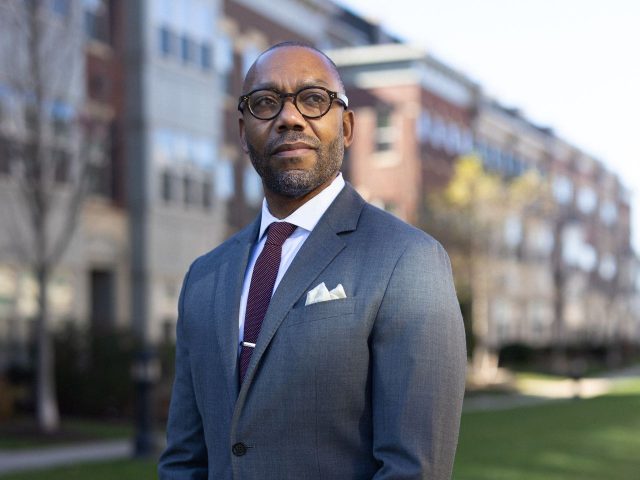By Andre Perry
Nikole Hannah-Jones, who won a Pulitzer prize for her work on the New York Times’ 1619 Project, was recently denied tenure by the board of trustees at the University of North Carolina. Hannah-Jones, a Black woman, is the only person named to the University’s Knight Chair in journalism not to receive tenure. Credit: AP Photo/Gerry Broome
I guess higher education isn’t the bastion of liberalism that conservatives grouse about.
Bowing to pressure from conservatives, the board overseeing the University of North Carolina at Chapel Hill denied tenure to journalist Nikole Hannah-Jones, lead author and director of The 1619 Project, a special issue of The New York Times Magazine that commemorated the 400-year anniversary of the arrival of 20 enslaved Africans who were sold into slavery to the shores of Virginia.
Hannah-Jones is the incoming Knight Chair — a professorship endowed by the John S. and James L. Knight Foundation. It’s a position that typically comes with the job security of tenure. In lieu of tenure, the university offered Hannah-Jones a five-year contract, which can be renewed at the end of the term.
The danger of the board’s action on her tenure — which the faculty and tenure committee voted to grant her — extends beyond the individual fight over Hannah-Jones’ position. The board’s rejection is an affront to faculty, students and anyone who values academic freedom, good governance, the role of the Fourth Estate in American democracy, and truth itself.
The tradition of tenure was mainly established as “the ultimate guarantor of free speech” for intellectuals like Hannah-Jones. Tenure is “an indefinite appointment that can be terminated only for cause or under extraordinary circumstances such as financial exigency and program discontinuation,” according to the American Association of University Professors (AAUP), the membership organization of faculty that developed the standards and procedures that maintain academic quality.
There’s shared agreement between the AAUP and the membership body for trustees, the Association of Governing Boards (AGB), on the duties and responsibilities for the three branches of higher education governance: boards, administration and faculty. The AGB and AAUP statements on governance reiterate that boards are ultimately responsible, lifting up their fiduciary and strategic planning duties. Faculty oversee academic decisions, and presidents manage administrative units.
Society ultimately benefits when researchers can produce work that doesn’t align with the political whims of the people who govern institutions of higher education. For the most part, boards of regents and trustees are political appointees, in the case of public institutions, or wealthy alumni, in the case of private institutions. These folks aren’t exactly of the people and for the people.
Giving them power to influence the free flow of ideas in academia undermines the very purpose of the university — and it’s dangerous for our democracy.
The UNC board overstepped its role in the shared governance structure that sustains colleges and universities; the faculty is in charge of such academic matters. To deny a single person tenure because of politics is clearly a violation of the tradition of shared governance. Conservatives who support overturning the faculty’s decision to grant Hannah-Jones tenure are making clear once again that they prefer despotism and demagoguery over democratic decision making and rigorous knowledge creation.
Hannah-Jones’s work is just the kind of rigorous scholarship our nation needs right now. She has prompted a national conversation about race by breaking up the fable that an idealistic group of “founding fathers,” many of whom owned slaves, are responsible for the democracy we know today. The reality is that the substance of American democracy developed from Black people’s pursuit of emancipation and equal rights under the law, a central premise of The 1619 Project.
Universities must protect scholars and scholarship because politicians with power will always discredit truth and diminish the accomplishments of those who oppose them to score political points. Black News Channel host Marc Lamont Hill interviewed Republican candidate for Georgia governor Vernon Jones, probing why he wants to ban critical race theory, an academic framework for understanding systemic racism. In a heated exchange about the meaning of critical race theory, Jones attacked Hill’s academic credential. “Ph.D’s come a dime a dozen … You’re as dumb as two left shoes,” Jones said. “Because you have a Ph.D., you haven’t practiced anything. You’re in the academic area. You haven’t done any real work.”
The UNC’s board decision not to give Hannah-Jones the protections that scholars before her have enjoyed is horribly predictable.
Hannah-Jones’ background is in journalism, and for the last four years, the conservative rhetorical gimmick, “fake news,” sought to discredit facts and make journalists enemies of the state. This month it was reported that the Justice Department under President Donald J. Trump secretly acquired Washington Post reporters’ home, work and cellphone numbers from April to July 2017 in a depraved and undemocratic attempt to learn who those journalists talked to.
And she is a Black woman. Throughout his presidency, Trump, still the de facto leader of the right wing in this country, called high-achieving Black women “low IQ,” “nasty,” “losers,” “dogs,” “stupid.” In 1962 Malcolm X said, “The most disrespected person in America is the Black woman. The most unprotected person in America is the Black woman. The most neglected person in America is the Black woman.”
If UNC’s governing board won’t protect Nikole Hannah-Jones, then the rest of us must. It’s clear that many conservatives don’t respect journalism, good governance and truth, all of which are embodied by Nikole Hannah-Jones. She is worthy of our protection.
Dr. Andre Perry, a contributing writer, is a David M. Rubenstein Fellow at The Brookings Institution. Perry was the founding dean of urban education at Davenport University in Grand Rapids, Mich.




